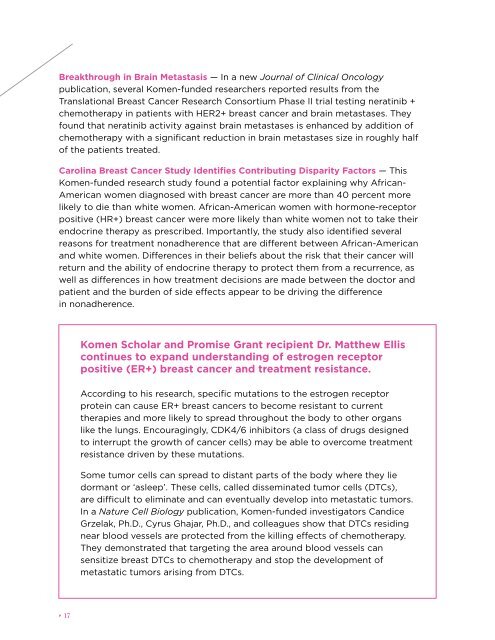Susan G. Komen Mission Impact Report 2019
Create successful ePaper yourself
Turn your PDF publications into a flip-book with our unique Google optimized e-Paper software.
Breakthrough in Brain Metastasis — In a new Journal of Clinical Oncology<br />
publication, several <strong>Komen</strong>-funded researchers reported results from the<br />
Translational Breast Cancer Research Consortium Phase II trial testing neratinib +<br />
chemotherapy in patients with HER2+ breast cancer and brain metastases. They<br />
found that neratinib activity against brain metastases is enhanced by addition of<br />
chemotherapy with a significant reduction in brain metastases size in roughly half<br />
of the patients treated.<br />
Carolina Breast Cancer Study Identifies Contributing Disparity Factors — This<br />
<strong>Komen</strong>-funded research study found a potential factor explaining why African-<br />
American women diagnosed with breast cancer are more than 40 percent more<br />
likely to die than white women. African-American women with hormone-receptor<br />
positive (HR+) breast cancer were more likely than white women not to take their<br />
endocrine therapy as prescribed. Importantly, the study also identified several<br />
reasons for treatment nonadherence that are different between African-American<br />
and white women. Differences in their beliefs about the risk that their cancer will<br />
return and the ability of endocrine therapy to protect them from a recurrence, as<br />
well as differences in how treatment decisions are made between the doctor and<br />
patient and the burden of side effects appear to be driving the difference<br />
in nonadherence.<br />
<strong>Komen</strong> Scholar and Promise Grant recipient Dr. Matthew Ellis<br />
continues to expand understanding of estrogen receptor<br />
positive (ER+) breast cancer and treatment resistance.<br />
According to his research, specific mutations to the estrogen receptor<br />
protein can cause ER+ breast cancers to become resistant to current<br />
therapies and more likely to spread throughout the body to other organs<br />
like the lungs. Encouragingly, CDK4/6 inhibitors (a class of drugs designed<br />
to interrupt the growth of cancer cells) may be able to overcome treatment<br />
resistance driven by these mutations.<br />
Some tumor cells can spread to distant parts of the body where they lie<br />
dormant or ‘asleep’. These cells, called disseminated tumor cells (DTCs),<br />
are difficult to eliminate and can eventually develop into metastatic tumors.<br />
In a Nature Cell Biology publication, <strong>Komen</strong>-funded investigators Candice<br />
Grzelak, Ph.D., Cyrus Ghajar, Ph.D., and colleagues show that DTCs residing<br />
near blood vessels are protected from the killing effects of chemotherapy.<br />
They demonstrated that targeting the area around blood vessels can<br />
sensitize breast DTCs to chemotherapy and stop the development of<br />
metastatic tumors arising from DTCs.<br />
17


